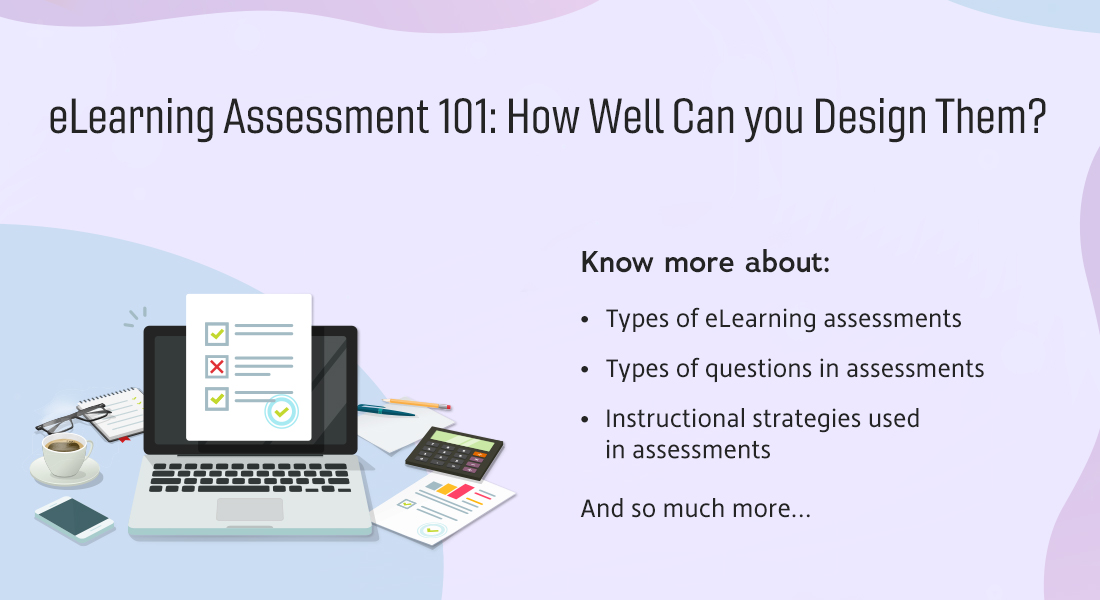The Role of Learning Analytics in Online Assessments

Assessments are an integral part of training programs and determine whether the goals of the training program are met. Consider this scenario:
The sales team in your organization has completed an online training program on a new product. A majority of the reps has scored more than 80% in the online assessment. Does that mean that your eLearning course is a resounding success?
Completion of an online training program, does not guarantee its success; similarly, a high score in assessments in an eLearning course does not mean that learners have gained a thorough understanding of the subject. How do you judge if the online training program that you rolled out has an effective assessment? Learning analytics comes to the rescue of L&D professionals and functional managers who need this question answered.
Learning analytics can show the following results for each question included in the online assessment:
- The number of learners who answered the question correctly.
- The percentage of learners who selected a particular response (in case of a multiple-choice question).
- The time taken to answer a question.
- The most popular response, and the percentage of learners who chose that response.
Assessments in eLearning courses are divided into two broad categories:
- Formative
- Summative
Learning Analytics in Formative Assessments
A formative assessment is used to track learners’ progress during the course, at the end of each unit/topic and provides feedback. Learners are usually allowed an extra attempt at questions that they have answered incorrectly, as the focus is on the learning behavior. A formative assessment identifies the areas of improvement that the learner needs to focus on, in the training program.
Read on to know how learning analytics can be used to evaluate formative assessments.
Track a Learner’s Progress
The data tracked from formative assessments can reveal a lot about the learner’s progress in each module or section of the eLearning course. Applying learning analytics on this data, can reveal distinct performance patterns. For example, if many learners are not performing well in the assessment of a particular section of the course, it’s time to evaluate the content in that section, or check if the assessment matches the content covered in that particular section.
Identify Improvement Areas
If learners fare poorly in the assessment of certain sections of the course, then it indicates that they need to work on improving their knowledge on those areas. Automated messages can be sent to the learner to refresh their knowledge on a specific module of the eLearning course.
Implementing learning analytics through the LMS helps learners by making it possible to:
- Send e-mails to learners on individual course progress and improvement areas
- Send e-mails to SMEs or training managers on learners who require additional help
Provide Personalized Feedback
Through learning analytics, it is easier to keep track of real-time performance on assessments. If learners perform poorly in the initial modules of the online training program, feedback can be provided immediately, instead of waiting for the learner to complete the entire eLearning course.
After all, immediate feedback is more helpful than delayed feedback.
Learning Analytics in Summative Assessments
A summative assessment is included at the end of the eLearning course and is designed to check the proficiency of the learner. At the end of the summative assessment, the learner is assigned a grade or awarded marks. Here is how learning analytics is useful in summative assessments.
Predict Learners Performance
The use of predictive analytics has made it easier to predict learners’ performance even before they attempt the assessment. A learning analytics dashboard can collate data from past assessments, and display the level of understanding of each learner, so that training managers can take the necessary action to improve learners’ performance.
Design Adaptive Assessments
Learning analytics can help develop adaptive assessments that go beyond the standard pattern followed in eLearning courses. In adaptive assessments, learners are presented with questions based on their response to the previous question. For example, if a learner answers a question of intermediate difficulty correctly, he/she is presented with a more difficult question. So, an adaptive assessment can actually shorten the time (by almost 50%) taken, and also offer a higher level of precision in evaluating learners.
Learning Analytics in Assessment Evaluation
Here is how results from learning analytics can be used to evaluate an assessment question, and the action plan to improve the assessment.
| Learning Analytics Results | Assessment Evaluation | Action Plan to Improve Assessment |
|
Less than 70% of learners get a particular question correct in the first attempt. If they are allowed a second attempt, then almost 95% of them get it right. |
The question is not framed correctly. It is possible that the question is based on a small piece of information that is not adequately covered in the eLearning course. |
Reword the question. Increase clarity on this piece of content. |
| Less than 70% of learners get a particular question correct in the first attempt. This number does not increase much, even in the next attempt. | The content on which this question is based needs to be checked, as it does not seem adequate. | Provide an elaborate explanation of the content. |
| Less than 40% of learners get a particular question correct on the first attempt, and the results do not improve on the second attempt either. | The skill required to answer this question is not covered in the eLearning course. | It would be better to remove this question. |
Functional managers and L&D professionals who would like to evaluate the effectiveness of assessments included in the eLearning courses rolled out to employees, can certainly make use of learning analytics. There is no doubt that the insight produced by learning analytics, can be used to improve assessments in online training programs.



![eLearning Assessments – How Well Do You Know Them? [Infographic]](https://blog.commlabindia.com/hubfs/Imported_Blog_Media/elearning-assessments-quick-refresher-infographic.jpg)

